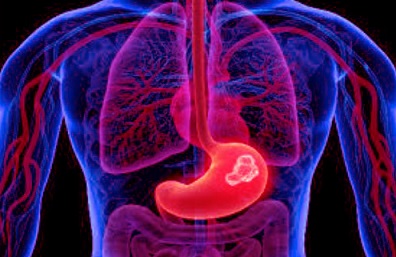New Study Links Helicobacter Pylori Infection to Higher Risk of Stomach Cancer in East Asia
Nikhil Prasad Fact checked by:Thailand Medical News Team Oct 29, 2024 1 year, 3 months, 1 week, 1 day, 4 hours, 36 minutes ago
Medical News: Rising Cancer Cases Linked to Common Bacteria
A recent comprehensive study conducted by researchers at the Medical School of Southeast University in Nanjing, China, and Zhongda Hospital, Southeast University, highlights a significant connection between Helicobacter pylori (H. pylori) infection and an increased risk of cardia gastric cancer (CGC) in East Asian countries. This
Medical News coverage reports on the findings, emphasizing the importance of understanding potential cancer risks in high-prevalence regions.
CGC, a cancer located at the top part of the stomach near the esophagus, has been on the rise in East Asia. While H. pylori has long been considered a risk factor for other types of stomach cancers, its association with CGC remained unclear. To clarify this, the researchers analyzed data from various studies spanning across China, Japan, Korea, and Iran, involving thousands of participants with varying infection statuses and cancer outcomes.
 New Study Links Helicobacter Pylori Infection to Higher Risk of Stomach
New Study Links Helicobacter Pylori Infection to Higher Risk of Stomach
Cancer in East Asia
Key Study Findings
The team conducted a systematic review and meta-analysis using data from 24 studies on H. pylori and CGC in East Asia. They found that individuals infected with H. pylori had a significantly higher likelihood - more than twice as likely - of developing CGC compared to those uninfected. Specifically, the data showed an odds ratio (OR) of 2.20, indicating that infected individuals were over twice as susceptible to CGC.
The study's findings further revealed that East Asian countries experienced some of the highest rates of CGC linked to H. pylori. In China, for instance, the likelihood of infection leading to CGC was 2.12 times greater among infected individuals than non-infected ones. This correlation was similarly observed in Japan and Korea, with ORs of 2.21 and 2.36, respectively. However, no such association was noted in Iran, suggesting geographical and possibly ethnic differences in risk factors and susceptibility.
Understanding H. pylori and Its Impact
H. pylori is a type of bacteria that commonly infects the stomach lining, affecting more than half of the world’s population. While many people harbor H. pylori without issues, it can lead to inflammation, ulcers, and, in more severe cases, cancer. This study highlights that the location of the infection within the stomach might influence cancer development pathways. Unlike other gastric cancers, CGC arises close to the esophagogastric junction, a complex area where tissue structure varies, possibly making it more vulnerable in H. pylori carriers.
One of the unique aspects of CGC development in East Asia is its association with H. pylori-induced mucosal changes. The researchers noted that, unlike Western countries where CGC is often linked to acid reflux, East Asian patients frequently display mucosal damage caused by H. pylori. This further supports the finding that infection may elevate CGC risk in these populations.
Importance of Early D
etection and Intervention
The study underlines the critical role of early detection and intervention to prevent H. pylori-related cancers. In high-risk areas, screening and timely treatment of H. pylori infections could reduce cancer incidence rates. The researchers observed that the risk of CGC was more significant when H. pylori status was determined before cancer symptoms emerged, suggesting that timely testing could be a valuable tool in cancer prevention efforts.
Additionally, the study recommended that doctors and healthcare providers in East Asia should closely monitor patients with H. pylori infections, especially those showing early signs of gastric mucosal changes. Screening methods such as endoscopy could detect abnormalities in these patients early, improving treatment outcomes and potentially reducing cancer mortality rates.
The Complexity of CGC: Different Influences in Different Regions
The study’s findings highlight how environmental, lifestyle, and biological factors intersect in different populations. For instance, in East Asia, where high-salt diets are common and alcohol consumption rates are high, the combination of H. pylori infection and lifestyle factors may increase vulnerability to CGC. In contrast, in Iran, the data did not show a meaningful link between H. pylori and CGC, raising questions about whether diet, genetics, or other regional factors might play a role in modulating this risk.
Conclusion
This study underscores the significant cancer risk that H. pylori infection poses for East Asian populations, particularly in countries like China, Japan, and Korea. By clarifying the role of H. pylori in CGC, the researchers hope to spur further studies that explore early detection and intervention strategies. The findings suggest that regular screening for H. pylori in at-risk populations could be a vital preventive measure. Moreover, considering the variations in risk by region, it’s essential to understand how local factors might affect the likelihood of CGC and tailor interventions accordingly.
The study findings were published in the peer-reviewed journal: Cancer Screening and Prevention.
https://www.xiahepublishing.com/2835-3315/CSP-2024-00016
For the latest Cancer News, keep logging on to Thailand
Medical News.
Read Also:
https://www.thailandmedical.news/news/new-findings-on-dendrobium-polysaccharides-show-promising-gastric-protection
https://www.thailandmedical.news/news/new-study-explores-the-genetic-connection-between-covid-19-and-gastric-cancer
